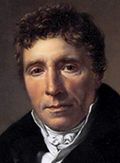 |
Emmanuel-Joseph Sieyès
b. 3 May 1748, Fréjus, Var
d. 20 Jun 1836, Paris |
| Title: |
Consul de la République française (Consul of the French Republic) |
| Term: |
10 Nov 1799 - 25 Dec 1799 |
| Chronology: |
10 Nov 1799, appointed by the Law of 19 Brumaire, Year VIII, passed by the Conseil des Anciens (Council of Ancients), galerie d'Apollon (grande galerie), Palais de Saint-Cloud, Saint-Cloud [1] |
|
11 Nov 1799, after 02:00, took the oaths of allegiance, separate sessions of the Conseil des Cinq-Cents (Council of Five Hundred) [2] and the Conseil des Anciens (Council of Ancients) [3], Palais de Saint-Cloud, Saint-Cloud |
|
25 Dec 1799, successors entered the office [4] |
| Names/titles: |
Surname also spelled as: Siéyès; comte Sieyès, comte de l'Empire (count Sieyès, count of the Empire) [from 3 Jun 1808] |
|
Président de l'Assemblée nationale (President of the National Assembly) (8 Jun 1790 - 21 Jun 1790) [see details]; Président de la Convention nationale (President of the National Convention) (20 Apr 1795 - 5 May 1795) [see details]; Membre du Directoire exécutif de la République française (Member of the Executive Directory of the French Republic) (20 May 1799 - 10 Nov 1799) [see details]; Président du Directoire exécutif de la République française (President of the Executive Directory of the French Republic) (19 Jun 1799 - 23 Sep 1799) [see details] |
| Biography: |
| Originated from a notary family of Fréjus; educated for an ecclesiastical career at the Doctrinaires' college in Draguignan; attended the seminaries of Saint-Sulpice (1765-1770) and Saint-Firmin (1770-1772) in Paris; was made a secretary to Jean-Baptiste-Joseph de Lubersac, bishop of Tréguier, Brittany (1775); accepted a canonry at Tréguier (1779); followed Lubersac who had been transferred to the bishopric of Chartres (1780); became a canon of the cathedral (1783) and chancellor of the diocese of Chartres (1788); appointed a commissioner at the Sovereign Chamber of Clergy of France (1787-1790); served as a member of provincial assembly of Orléans (1787); issued pamphlet Qu'est-ce que le tiers état? (1789), identifying the unprivileged Third Estate with the French nation; elected (19 May 1789) as a representative of the Third Estate by the constituency of Paris to the États-Généraux (Estates-General); was one of the initiators of declaring the Estates-General an assembly of representatives of the French people (15 Jun 1789); deputy of the Assemblée nationale (National Assembly) (1789-1791); served as President of the National Assembly (8 Jun 1790 - 21 Jun 1790); elected to Convention nationale (National Convention), representing the département of Sarthe (1792-1795); voted for the execution of King Louis XVI; served as a member of the Comité de salut public (Committee of Public Safety) (5 Mar 1795 - 3 Jul 1795, 2 Aug 1795 - 4 Nov 1795); elected President of the National Convention (20 Apr 1795 - 5 May 1795); elected (15 Oct 1795) to the Corps législatif by 19 départements, opted for Sarthe; selected for sitting in the Conseil des Cent-Cents (Council of Five Hundred); elected (1 Nov 1795) a member of the Directoire exécutif (Executive Directory), but declined (2 Nov 1795); survived an assassination attempt (12 Apr 1797); President of the Council of Five Hundred (21 Nov 1797 - 21 Dec 1797); appointed (10 May 1798) ambassador to the Kingdom of Prussia; elected a member of the Executive Directory for the second time (16 May 1799) to replace Jean-François Reubell; returned to Paris (7 Jun 1799) and assumed his seat (9 Jun 1799); served as President of the Directory (19 Jun 1799 - 23 Sep 1799); conspiring with Napoléon Bonaparte, helped organize the 18 Brumaire coup (9 Nov 1799 - 10 Nov 1799) that overthrew the Directory; appointed Consul of the Republic (10 Nov 1799 - 25 Dec 1799) along with Bonaparte and Pierre-Roger Ducos; drafted the Constitution of Year VIII; nominated member of the Sénat conservateur (ex officio as the outgoing consul according to Art. 24, Constitution of Year VIII, effective 25 Dec 1799); served as President of the Sénat conservateur (25 Dec 1799 - 25 Mar 1800); nominated grand officer of the Legion of Honour (14 Jun 1803), count of the empire (3 Jun 1808); nominated to the Chambre des pairs (Chamber of Peers) (2 Jun 1815) during the Cent-Jours (Hundred Days); banished as a regicide (1815) and did not return to France until 1830.
Biography source: [5] |
| |
| [1] |
Bulletin des lois de la République, No. 323, pp. 1-5. |
| [2] |
Moniteur universel, No. 53, 23 brumaire an VIII, p. 207. |
| [3] |
Moniteur universel, No. 51, 21 brumaire an VIII, p. 200. |
| [4] |
The terms of office for provisional consuls were not defined by the Law of 19 brumaire, Year VIII, which appointed the Commission consulaire exécutive (Executive Consular Commission). Art. I of the law of 3 Nivôse, Year VIII (24 Dec 1799) appointed 25 Dec 1799 (4 nivôse an VIII) as the date for the new consuls named in the Constitution of Year VIII to enter their offices, thus terminating the terms of provisional consuls. |
| [5] |
Dictionnaire des parlementaires français 1789-1889, |

